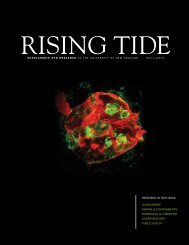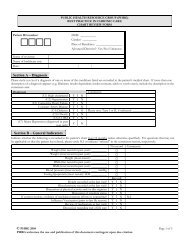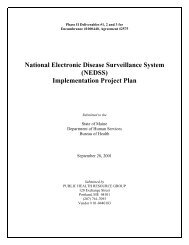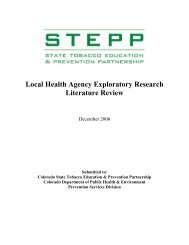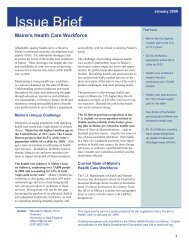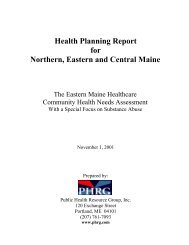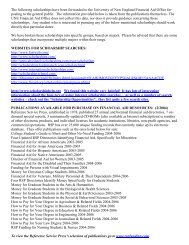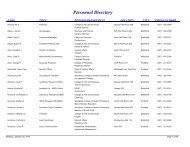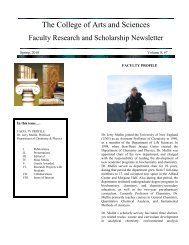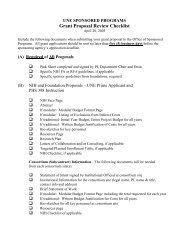Acute Flaccid Paralysis Accompanying West Nile Meningitis Ahmed ...
Acute Flaccid Paralysis Accompanying West Nile Meningitis Ahmed ...
Acute Flaccid Paralysis Accompanying West Nile Meningitis Ahmed ...
Create successful ePaper yourself
Turn your PDF publications into a flip-book with our unique Google optimized e-Paper software.
Case Report: Wernicke-Korsakoff Syndrome<br />
Doyle, R, OMS III. Podolski, J, D.O.<br />
Department of Psychiatry, Eastern Connecticut Health Network, Manchester, Connecticut<br />
Introduction: Wernicke-Korsakoff syndrome is a neurological manifestation of thiamine<br />
deficiency often seen in chronic alcoholics. Wernicke’s encephalopathy (WE) is the first stage<br />
of the disease, presenting with the classic triad of encephalopathy, ophthalmoplegia, and<br />
ataxia. Korsakoff syndrome (KS) is a later stage of the same disease, characterized by<br />
anterograde and retrograde amnesia, confabulation, impairments in attention and<br />
concentration, and lack of insight or complete denial of illness. This case study highlights a<br />
situation where a patient failed to disclose the extent of their alcohol abuse history.<br />
Case: Our patient was a 59-year-old Caucasian man who presented for a scheduled vascular<br />
surgery procedure; namely aortobifemoral bypass for aortic occlusive disease. There was<br />
some indication pre-operatively that the patient had issues with alcohol abuse; however, there<br />
was no documented history of alcohol dependence. Additionally, probably for a multitude of<br />
reasons unknown to this writer, the patient and his family minimized his alcohol use. On<br />
postoperative day two, the patient became confused, lethargic and underwent respiratory<br />
failure requiring intubation. His surgeon quickly identified delirium, and suspecting WE ordered<br />
IM and IV thiamine, along with initiating a Clinical Institute Withdrawal Assessment (CIWA)<br />
with Lorazepam. At that point the patient’s wife disclosed to the treatment team that she<br />
believed her husband was an alcoholic, and that he was frequently abusing alcohol just prior<br />
to surgery. Neurologic and psychiatric consultations provided treatment recommendations for<br />
his WE, however by postoperative day twenty-two he remained ataxic, irritable, unable to<br />
follow simple instructions, disoriented to place and time, and appeared to be responding to<br />
visual hallucinations. At that point Risperidone, an atypical antipsychotic, was added as a<br />
standing dose to his medication regimen. Nursing staff was instructed to utilize atypical<br />
antipsychotics in the place of benzodiazepines for acute agitation due to concerns that the<br />
benzodiazepines were actually disinhibiting him rather than acting favorably towards<br />
behavioral control. Subsequently, with the addition of a second atypical antipsychotic,<br />
Quetiapine, his behavior improved, along with his sleep, appetite, and he was no longer<br />
ataxic. However, he remained inattentive, exhibited profound impairments in retrograde<br />
amnesia, and he began confabulating. At that point the suspected diagnosis of KS was made,<br />
and by postoperative day forty-four, against medical advice, the patient was discharged to the<br />
care of his wife despite recommendations for him to be placed in a rehab facility.<br />
Discussion: Rapid assessment and treatment of thiamine deficiency is paramount in the<br />
prevention of Korsakoff syndrome. This case not only demonstrates the clinical manifestations<br />
of Wernicke-Korsakoff syndrome, but it also highlights several social and psychological factors<br />
that complicated this particular clinical course. Specifically, this case illustrates the social<br />
stigma related to substance abuse and mental health issues, as well as the pathologic<br />
psychological codependency between the patient and his wife (e.g. wife’s enabling of the<br />
patient’s alcoholism).



